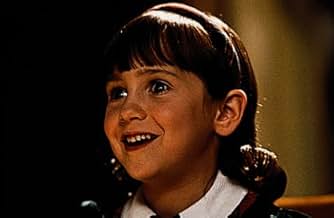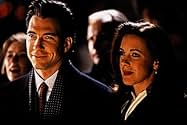A lawyer and a little girl must prove that a man claiming to be Santa Claus is the real thing.A lawyer and a little girl must prove that a man claiming to be Santa Claus is the real thing.A lawyer and a little girl must prove that a man claiming to be Santa Claus is the real thing.
- Awards
- 1 nomination
Movie and TV Santas We Love
Movie and TV Santas We Love
Celebrate the most wonderful time of the year with some of our favorite portrayals of Santa Claus.
Storyline
Did you know
- TriviaMacy's declined the offer for its name to be used in this movie, on account that it felt that "the original stands on its own and could not be improved upon". The department store was then renamed to Cole's.
- GoofsWhen Kris tells the little girl his name in other countries, he states that in Italy his name is "La Befana", however, that is the name of the kind witch that flies around filling stockings on January 6th. His Italian name is "Babbo Natale".
- Quotes
[last lines]
Dorey Walker: Susan.
Susan Walker: What?
Dorey Walker: What else did you ask Mr. Kringle for?
Susan Walker: A baby brother. See ya.
- SoundtracksJingle Bells
Performed by Natalie Cole
Written by James Pierpont
Produced by Tommy LiPuma
Courtesy of Elektra Records
Featured review
Richard Attenborough returned to acting after 14 years behind the camera in "Jurassic Park", and followed it swiftly by daring to challenge comparison with Oscar-winner Edmund Gwenn in this remake.
As a heartwarmer for those inadequates who won't sit through a 60-year-old monochrome movie-- albeit one which rivals "It's a Wonderful Life" as Hollywood's answer to "A Christmas Carol"-- this John Hughes revamp will probably serve. Anyhow, there are plenty of copies on sale at the checkout of my local supermarket. But it is a bit too laid-back and, latterly, too bogged down in argument for younger kids or older boys. It may warm more cockles among the grandparents.
The main thematic interest is how Hughes chooses to tweak the original screen story as adapted (unusually for the time) by the director, George Seaton. Whether he sought to or not, the remake has thrown up some intriguing twists for a more skeptical and secular time.
The oldie caught the mood of an America yearning to get back to normalcy amid the perils of the post-war, Cold War world. Location shooting in New York City, with much co-operation from Macys, gave a touch of realism to the fantasy, whereas in 1994 it's an imaginary store and (for Americans, at least) an incongruously "veddy British" claimant to the chair of Santa Claus- although his nationality is not the issue when the legal meanies of the State of New York try to get him confined to the bughouse.
What is striking is the judge's rationale for allowing Kris's plea for freedom. Because US bills have "In God We Trust" on them, he reasons, it means New York is allowed to have blind faith in the existence of a supernatural being who lays presents on 1.7 billion children in one night, operating from invisible workshops with reindeer which cannot be made to fly in a courtroom demonstration of his powers because it isn't Christmas Eve. Besides, the sneery prosecutor's kids were raised to believe in him, so there- case closed.
In real life the ACLU would be appealing such a judgement all the way to the Supreme Court for allowing too much religion into the law and the public square. "In God We Trust" was only put on the money during the Cold War, to cock a snook at "Godless bolshevism"; but this film is refreshingly disrespectful to the newer orthodoxy of playing down most Americans' beliefs in their films.
Kris asks if he should swear in the Bible, the Pope's ruling on Nicholas's sanctity is debated, and the ethos is quietly but unmistakably Christian. No "spiritual" Santa or "Happy Holidays" here. In a very light fashion, the film does revolve issues of how far it is legitimate to maintain a metaphor as a source of inspiration when rationalism of the Dawkins and Hitchens strain is sniping at it. The screenplay also looks quite beadily at the way commercial operators use holy myth to make money, even if the message comes muted from Hollywood.
That is the good news. There's plenty to carp at as well.
Attenborough's quiet, gentle but firm performance (most atypical of one who spent his previous acting time mainly playing unreliables or martinets) suffuses the film. He gets little competition, save from the contrasted crustiness of Windom. Most of the support is so-so, on the level of a Yuletide TV special, and not excluding little Wilson as the girl who has faith in Mr Kringle's claim to be St Nicholas. She is no Margaret O'Brien, if no worse in her way than the kewpie-doll Natalie Wood. In fact, she's a John Hughes moppet who did little later and nothing since 2000.
The narrative's departures from the well shaped original are no help. Once off the legal hook, Kris, wearing a brown suit, just disappears-- we don't see any triumphal sleigh ride to bid him adieu-- while attention shifts to a ridiculous post-midnight-mass impromptu wedding in a Catholic church. Then follows a trip out to a dream house in the snowy country, ushered by a silly salesman. The film does not seem to know when to call a halt, and there's not so much as Clarence's tinkling bell to bring back Kris at the close. It's as if the whole object of the exercise was to unite two bland characters in matrimony.
As a heartwarmer for those inadequates who won't sit through a 60-year-old monochrome movie-- albeit one which rivals "It's a Wonderful Life" as Hollywood's answer to "A Christmas Carol"-- this John Hughes revamp will probably serve. Anyhow, there are plenty of copies on sale at the checkout of my local supermarket. But it is a bit too laid-back and, latterly, too bogged down in argument for younger kids or older boys. It may warm more cockles among the grandparents.
The main thematic interest is how Hughes chooses to tweak the original screen story as adapted (unusually for the time) by the director, George Seaton. Whether he sought to or not, the remake has thrown up some intriguing twists for a more skeptical and secular time.
The oldie caught the mood of an America yearning to get back to normalcy amid the perils of the post-war, Cold War world. Location shooting in New York City, with much co-operation from Macys, gave a touch of realism to the fantasy, whereas in 1994 it's an imaginary store and (for Americans, at least) an incongruously "veddy British" claimant to the chair of Santa Claus- although his nationality is not the issue when the legal meanies of the State of New York try to get him confined to the bughouse.
What is striking is the judge's rationale for allowing Kris's plea for freedom. Because US bills have "In God We Trust" on them, he reasons, it means New York is allowed to have blind faith in the existence of a supernatural being who lays presents on 1.7 billion children in one night, operating from invisible workshops with reindeer which cannot be made to fly in a courtroom demonstration of his powers because it isn't Christmas Eve. Besides, the sneery prosecutor's kids were raised to believe in him, so there- case closed.
In real life the ACLU would be appealing such a judgement all the way to the Supreme Court for allowing too much religion into the law and the public square. "In God We Trust" was only put on the money during the Cold War, to cock a snook at "Godless bolshevism"; but this film is refreshingly disrespectful to the newer orthodoxy of playing down most Americans' beliefs in their films.
Kris asks if he should swear in the Bible, the Pope's ruling on Nicholas's sanctity is debated, and the ethos is quietly but unmistakably Christian. No "spiritual" Santa or "Happy Holidays" here. In a very light fashion, the film does revolve issues of how far it is legitimate to maintain a metaphor as a source of inspiration when rationalism of the Dawkins and Hitchens strain is sniping at it. The screenplay also looks quite beadily at the way commercial operators use holy myth to make money, even if the message comes muted from Hollywood.
That is the good news. There's plenty to carp at as well.
Attenborough's quiet, gentle but firm performance (most atypical of one who spent his previous acting time mainly playing unreliables or martinets) suffuses the film. He gets little competition, save from the contrasted crustiness of Windom. Most of the support is so-so, on the level of a Yuletide TV special, and not excluding little Wilson as the girl who has faith in Mr Kringle's claim to be St Nicholas. She is no Margaret O'Brien, if no worse in her way than the kewpie-doll Natalie Wood. In fact, she's a John Hughes moppet who did little later and nothing since 2000.
The narrative's departures from the well shaped original are no help. Once off the legal hook, Kris, wearing a brown suit, just disappears-- we don't see any triumphal sleigh ride to bid him adieu-- while attention shifts to a ridiculous post-midnight-mass impromptu wedding in a Catholic church. Then follows a trip out to a dream house in the snowy country, ushered by a silly salesman. The film does not seem to know when to call a halt, and there's not so much as Clarence's tinkling bell to bring back Kris at the close. It's as if the whole object of the exercise was to unite two bland characters in matrimony.
Everything New on Hulu in December
Everything New on Hulu in December
There's a whole lot to love about Hulu's streaming offerings this month — get excited for brand-new series premieres and film favorites to watch at home.
Details
- Release date
- Country of origin
- Languages
- Also known as
- Milagro en la calle 34
- Filming locations
- Production companies
- See more company credits at IMDbPro
Box office
- Gross US & Canada
- $17,320,136
- Opening weekend US & Canada
- $2,753,208
- Nov 20, 1994
- Gross worldwide
- $46,264,384
- Runtime1 hour 54 minutes
- Color
- Sound mix
- Aspect ratio
- 1.85 : 1
Contribute to this page
Suggest an edit or add missing content









































